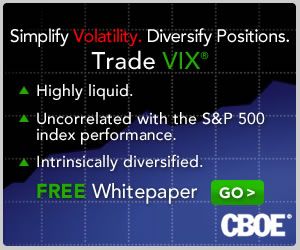Puts, the VIX and Intra-Month Volatility
If he keeps it up, Bernie Schaeffer is in danger of garnering honorary VIX pundit status, due to his tendency to talk about the VIX almost as much as Adam Warner and I do. Today, Schaeffer discusses the monthly VIX cycle and ties it in with the recent low VIX readings as follows:
“…the relatively low VIX could entice a number of options players to snatch up put options when trading starts today in an effort to lock in some ‘cheap’ protection. This would put downside pressure on the market.
As we have seen in the past, while expiration week tends to be strong for the market, the week following option expiration is often marred by a pullback in the major indices. Frequently, traders will jump back into put positions now that their previous positions have expired. This swelling in bearish bets is accompanied by hedging among the traders who take the other side of that trade and sell the puts, another factor that creates downside pressure.
Turning to a chart of the VIX, I found that over the past year, VIX peaks have been in the first half of the month, with the very notable exception of May 2006 and also November 2006 (July 2006 is on the bubble).
Another way of framing this could be that in the post-expiration period each month (always in the second half), market performance is ‘challenged’ by the fact low VIX periods attract put buyers and stock sellers. A better explanation might be that the rise in the VIX from the second half of a typical month into a peak in the first half of the next month is the result of the accumulation of index puts in the new front month, with the VIX peaking (and selling pressure lifting) once all the put demand is satisfied.”
I made a similar observation on VIX price movements during the options expiration cycle, which was also supported by an examination of VIX prices during the quarterly earnings cycle.
Could cheap portfolio insurance and the options expiration cycle be part of a vicious circle for the VIX? If so, what happens when portfolio insurance gets more expensive and this circle is broken?
I will kick this one around a little and update my thinking here as it evolves.


